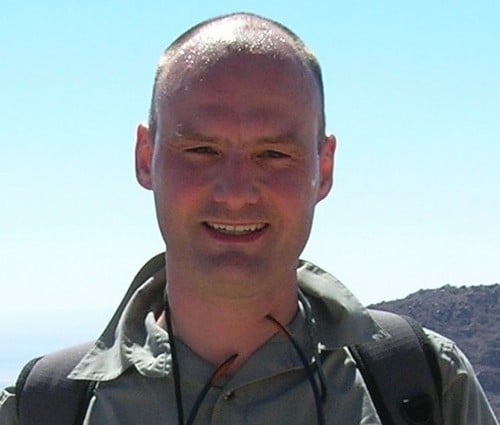This DeSmog UK epic history post introduces you to a young geologist who joined the fight against climate deniers in an effort to support the Intergovernmental Panel on Climate Change’s (IPCC) findings.
Bob Ward, policy and communications director at the Grantham Research Institute on Climate Change and the Environment at the London School of Economics, hates to see the public misinformed on science.
As an A-level student at Southend School for Boys in the mid-eighties, he read an article in the Guardian which had confused the hole in the ozone layer with global warming, attributing global warming to aerosols.
The outraged teenager wrote to science editor Tim Radford to notify him of the mistake. Later, as a geology PhD student, he became staunchly anti-Greenpeace after he saw one of their posters wrongly claiming that an area proposed for storing nuclear waste was an earthquake zone.
In 1999, after spending 10 years trying to finish his PhD in experimental rock deformation and a brief stint working as a science reporter for The Daily Telegraph, he found himself working in the Policy Department of the Royal Society.
Exxon’s Lecture
A few months into his job, Ward was invited to a seminar at Exxon’s London HQ. Brian Flannery, ExxonMobil’s veteran climate advisor, would be speaking.
Earlier in his career as an astrophysicist, Flannery had started to produce peer-reviewed work for the IPCC. At Exxon he would commission work from MIT climate modellers, who he would instruct to “embrace the uncertainty of all this”.
He was now being called in to talk to UK policy bodies and politicians about how the IPCC’s conclusions were far from certain and did not support such extreme measures as Kyoto.
“Why does Exxon have such a problem with the IPCC?” Ward recalls having thought at the time.
The Wider Campaign
The young geologist was bemused by the whole charade: his work at the Royal Society had included a project on the contribution of nuclear energy to tackling climate change, which was “framed in terms of nuclear being an important way for the UK to reduce its greenhouse gas emissions which seemed to me to be a perfectly reasonable thing.”
Ward would later recognise the context of Flannery’s talk: “I did not realise it at the time, but this meeting was part of a wider campaign by the oil company to resist restrictions on greenhouse gas emissions, including those applied to the burning of fossil fuels.”
In the United States, Exxon was engaged in intensive lobbying efforts against the Kyoto protocol, including advertisements that questioned the scientific basis for reducing greenhouse gas emissions.
This was all changed by President George W. Bush and the Kyoto Protocol.
In 2001, Ward was heading the Royal Society’s Press Office. When Bush announced that the US wasn’t going to ratify Kyoto – and what’s more, that he wasn’t sure of the science – the Royal Society joined with 15 other national science academies to combat Bush’s scepticism by endorsing the IPCC’s main conclusions.
Next up on the DeSmog UK epic history series, Roger Bate and Julian Morris were also making the best of Exxon’s spending bonanza.
Photo: Bob Ward via Twitter
Subscribe to our newsletter
Stay up to date with DeSmog news and alerts






